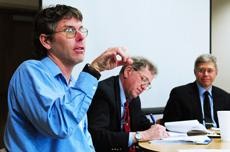For better or worse, the Internet has become a ubiquitous aspect of student life. As students turn more to the web for research, news and other information, one question worth asking is: What is the difference between good and bad information, and how can you tell which is which?
Scholars from the philosophy and library science departments met over the weekend to discuss this question at a roundtable conference titled “”Misinformation and Disinformation””. Topics at the discussion included defining those terms and looking at what, philosophically speaking, constitutes trust.
“”The simple version of it would be to say that disinformation is inaccurate information that’s intended to be inaccurate, whereas misinformation is everything else, mistakes and other sorts of things,”” said Don Fallis, philosophy and library sciences professor.
“”The basic idea is that information that’s inaccurate or misleading can cause people to have false beliefs about the world,”” Fallis said. “”Depending on what those false beliefs are, they can be really problematic. If you have a false belief about what drug you should take, what stocks you should invest in, you’re going to get into trouble.””
Fallis cited the rise of self-publication on the Internet as a potential problem for people like students who depend on the accuracy of available information.
Jana Bradley, a library sciences professor who attended the discussion, agreed.
“”We’re emerging from a society that has had, in the last decade, norms of (publishing) authority into a society where those norms aren’t gatekeepers anymore,”” Bradley said. “”So you write your own book, and it doesn’t have to go through anybody, it goes right out into the public. Does anybody care whether it’s edited? It used to be that you were an author if a publisher published your manuscript. Now we’re having to ask if those norms have changed.””
Condemnation of self-publication often leads to Wikipedia, the popular online encyclopedia that anyone with a computer can contribute to or edit, and now consists of 12 million articles in 236 languages.
Jill Newby, an associate librarian, said Wikipedia should be approached with caution but that it’s not all bad.
“”(Wikipedia is) an interesting case. I’ve seen articles there that have the same vetting and peer-review process as any article in a scholarly journal, even where articles are being written by scientists themselves, and sometimes they’re very well organized and accurate,”” Newby said. “”But that doesn’t mean there isn’t still bad stuff out there too.””
Every website should be approached the same way: critically, she said, adding that one thing students should always do is check the URL for clues about who the author is and what their motives might be.
“”If it’s ‘.edu’, that’s usually ok, but not always. If it’s ‘.com’, then you have to consider that the author might be trying to sell you something,”” she said. “”Things like Google are great, I use them every day, but many students forget to look past the first three hits. There’s so much information out there, so you really need to evaluate sources one-by-one.””









